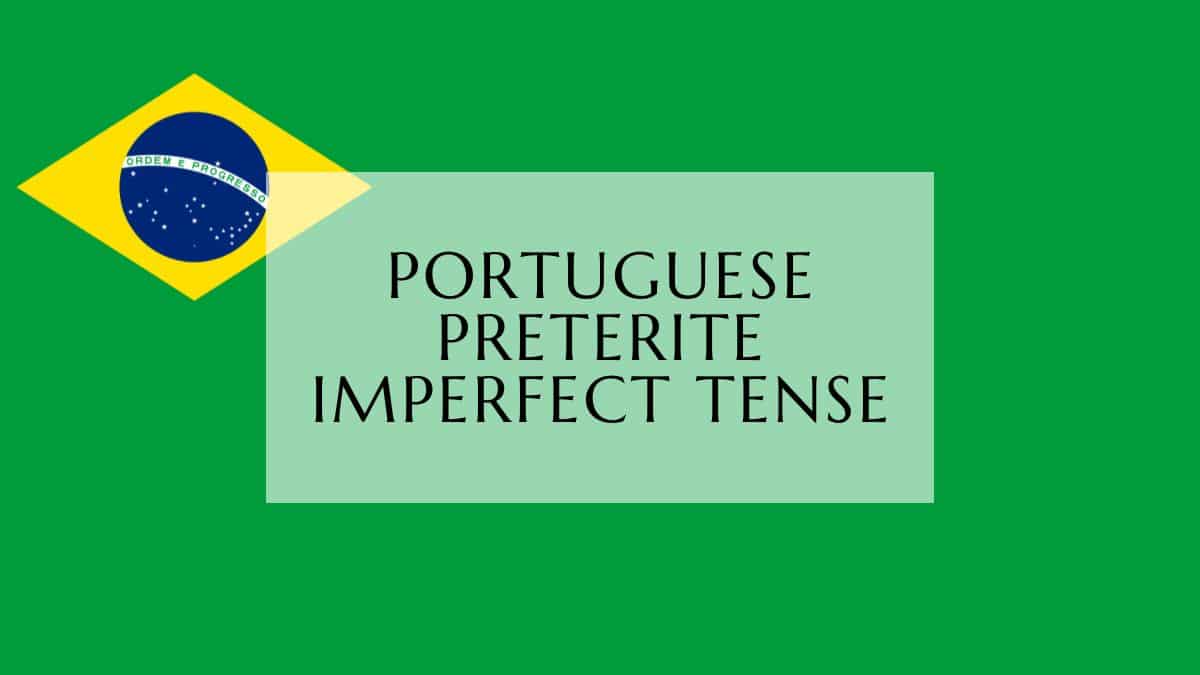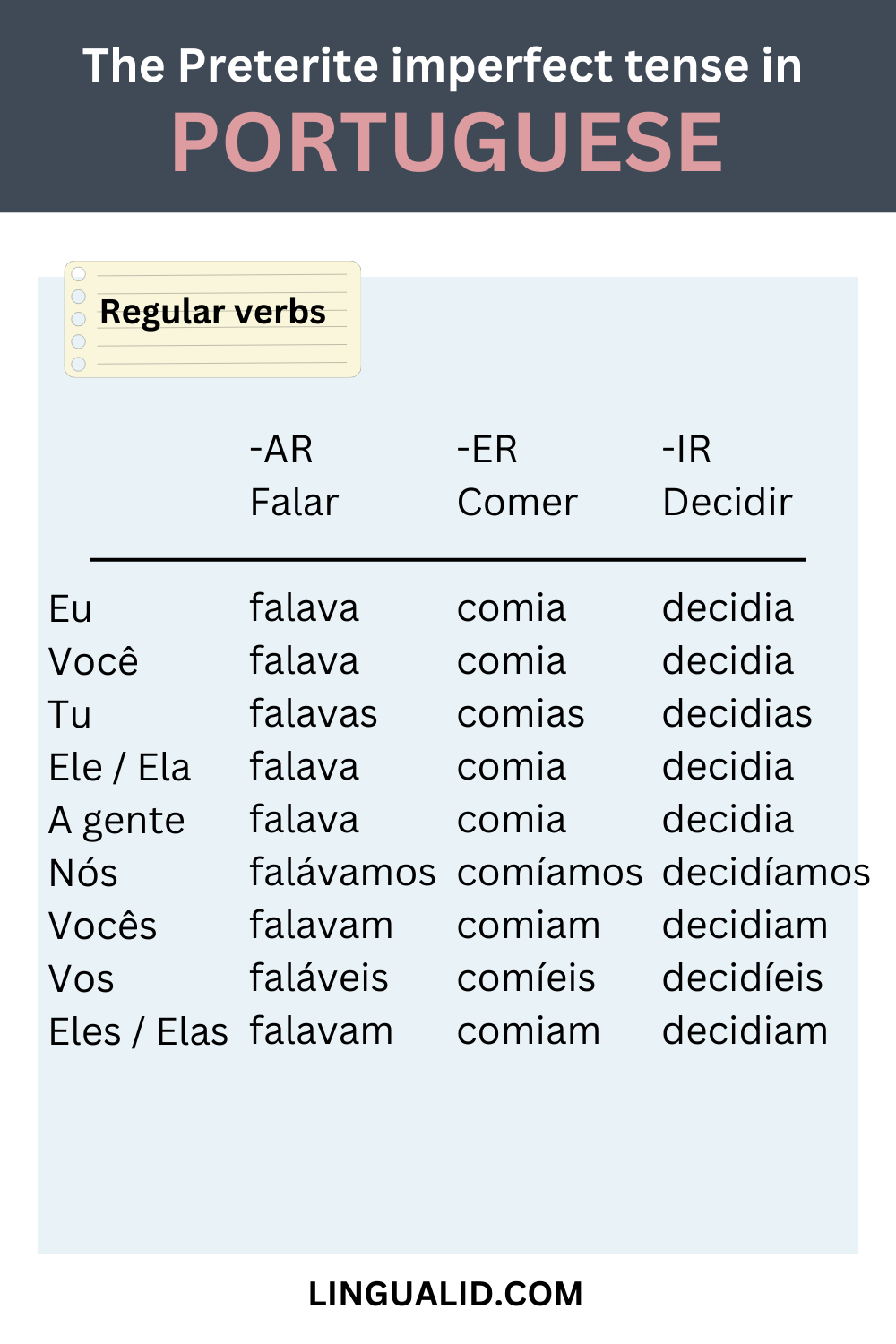The preterite imperfect tense in Portuguese (Pretérito Imperfeito) is used to express an action in the past that has not been completed, or that used to happen but not anymore (EN used to), or to express an action that was happening at the same time as another action, in this lesson we will talk about the conjugation of each type (-ar, -er and -ir) and give some examples.

Preterite Imperfect Tense In Portuguese
Like we’ve seen in the preterite tense lesson, there are three types of endings, and for regular verbs, they follow the following patterns:
Verbs that end with -ar
| Eu | -ava |
| Você | -ava |
| Tu | -avas |
| Ele / Ela | -ava |
| A gente | -ava |
| Nós | -ávamos |
| Vocês | -avam |
| Vos | -áveis |
| Eles / Elas | -avam |
Example: Estudar (to study):
| Eu | estudava |
| Você | estudava |
| Tu | estudavas |
| Ele / Ela | estudava |
| A gente | estudava |
| Nós | estudávamos |
| Vocês | estudavam |
| Vos | estudáveis |
| Eles / Elas | estudavam |
Example: Falar (to speak)
| Eu | falava |
| Você | falava |
| Tu | falavas |
| Ele / Ela | falava |
| A gente | falava |
| Nós | falávamos |
| Vocês | falavam |
| Vos | faláveis |
| Eles / Elas | falavam |
Verbs that end with -er
| Eu | -ia |
| Você | -ia |
| Tu | -ias |
| Ele / Ela | -ia |
| A gente | -ia |
| Nós | -íamos |
| Vocês | -iam |
| Vos | -íeis |
| Eles / Elas | -iam |
Example: aprender (to learn)
| Eu | aprendia |
| Você | aprendia |
| Tu | aprendias |
| Ele / Ela | aprendia |
| A gente | aprendia |
| Nós | aprendíamos |
| Vocês | aprendiam |
| Vos | aprendíeis |
| Eles / Elas | aprendiam |
Example: comer (to eat)
| Eu | comia |
| Você | comia |
| Tu | comias |
| Ele / Ela | comia |
| A gente | comia |
| Nós | comíamos |
| Vocês | comiam |
| Vos | comíeis |
| Eles / Elas | comiam |
Note: you can practice what you’ve learned here, and learn how to pronounce each of the words in our Memrise course here, don’t know how to use the platform or sign up? we’ve got you covered in this easy-to-follow tutorial here.
Verbs that end with -ir
| Eu | -ia |
| Você | -ia |
| Tu | -ias |
| Ele / Ela | -ia |
| A gente | -ia |
| Nós | -íamos |
| Vocês | -iam |
| Vos | -íeis |
| Eles / Elas | -iam |
Example: decidir (to decide)
| Eu | decidia |
| Você | decidia |
| Tu | decidias |
| Ele / Ela | decidia |
| A gente | decidia |
| Nós | decidíamos |
| Vocês | decidiam |
| Vos | decidíeis |
| Eles / Elas | decidiam |
Example: partir (to leave)
| Eu | partia |
| Você | partia |
| Tu | partias |
| Ele / Ela | partia |
| A gente | partia |
| Nós | partíamos |
| Vocês | partiam |
| Vos | partíeis |
| Eles / Elas | partiam |

Some irregular verbs
Ser (to be)
| Eu | era |
| Você | era |
| Tu | eras |
| Ele / Ela | era |
| A gente | era |
| Nós | éramos |
| Vos | éreis |
| Vocês | eram |
| Eles / Elas | eram |
Ter (to have)
| Eu | tinha |
| Você | tinha |
| Tu | tinhas |
| Ele / Ela | tinha |
| A gente | tinha |
| Nós | tínhamos |
| Vos | tínheis |
| Vocês | tinham |
| Eles / Elas | tinham |
Vir (to come)
| Eu | vinha |
| Você | vinha |
| Tu | vinhas |
| Ele / Ela | vinha |
| A gente | vinha |
| Nós | vínhamos |
| Vos | vínheis |
| Vocês | vinham |
| Eles / Elas | vinham |
The Preterite Imperfect Tense in Portuguese Review
Quiz
Instructions: Answer the following questions in 2-3 sentences using complete and grammatically correct English.
- What is the key difference between the Preterite Imperfect Tense and the Preterite Tense in Portuguese?
- Provide an example of a sentence using the Preterite Imperfect Tense with an -ar verb.
- How would you conjugate the verb comer (to eat) in the Preterite Imperfect Tense for the pronoun “Eles”?
- When would you use the Preterite Imperfect Tense to describe a state of being in the past?
- What is the Preterite Imperfect Tense conjugation of the verb ser (to be) for the pronoun “Nós”?
- Translate the following sentence into English: “Quando eu era criança, eu brincava no parque todos os dias.”
- Explain the difference in meaning between these two sentences: a) “Eu estudei português.” b) “Eu estudava português.”
- Provide an example of a sentence in Portuguese using the Preterite Imperfect Tense to describe an ongoing action interrupted by another action.
- How does understanding the context of a sentence help you choose between using the Preterite Tense and the Preterite Imperfect Tense?
- Why is it important to learn irregular verb conjugations in the Preterite Imperfect Tense?
Answer Key
- The Preterite Imperfect Tense describes ongoing or habitual actions in the past, while the Preterite Tense focuses on completed actions.
- Example: Ela cantava muito bem quando era criança. (She used to sing very well when she was a child.)
- Eles comiam.
- You would use the Preterite Imperfect Tense to describe a state of being in the past when you want to emphasize the duration or persistence of that state. For example, “Ele era alto e magro.” (He was tall and thin.)
- Nós éramos.
- When I was a child, I used to play in the park every day.
- a) “Eu estudei português” means “I studied Portuguese” and suggests a completed action in the past. b) “Eu estudava português” means “I used to study Portuguese” or “I was studying Portuguese” and indicates an ongoing or habitual action in the past.
- Example: Eu estava lendo um livro quando o telefone tocou. (I was reading a book when the phone rang.)
- The context of a sentence provides clues about whether the action was completed or ongoing in the past. This helps determine whether to use the Preterite Tense for a completed action or the Preterite Imperfect Tense for an ongoing or habitual action.
- Irregular verbs do not follow the regular conjugation patterns, so it’s crucial to memorize their forms in the Preterite Imperfect Tense to use them accurately.
Happy learning!
Oualid Cheddadi is a language enthusiast who created Lingualid with the mission to inspire independent language learners worldwide, regardless of the language they are learning. The name “Lingualid” is derived from the Portuguese word for “language,” “língua,” and the last three letters of Oualid’s name, “Lid.”
